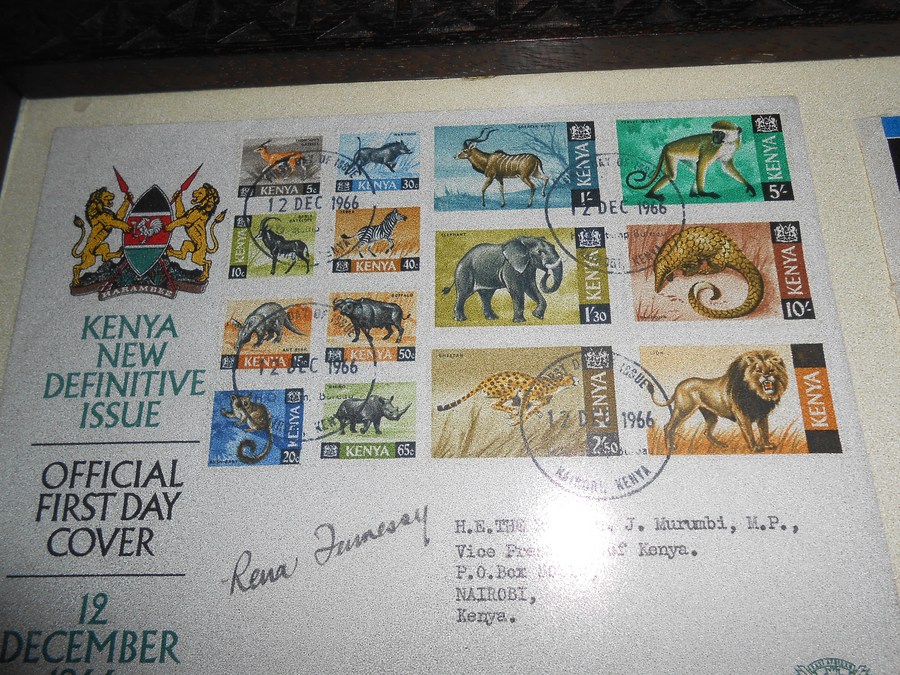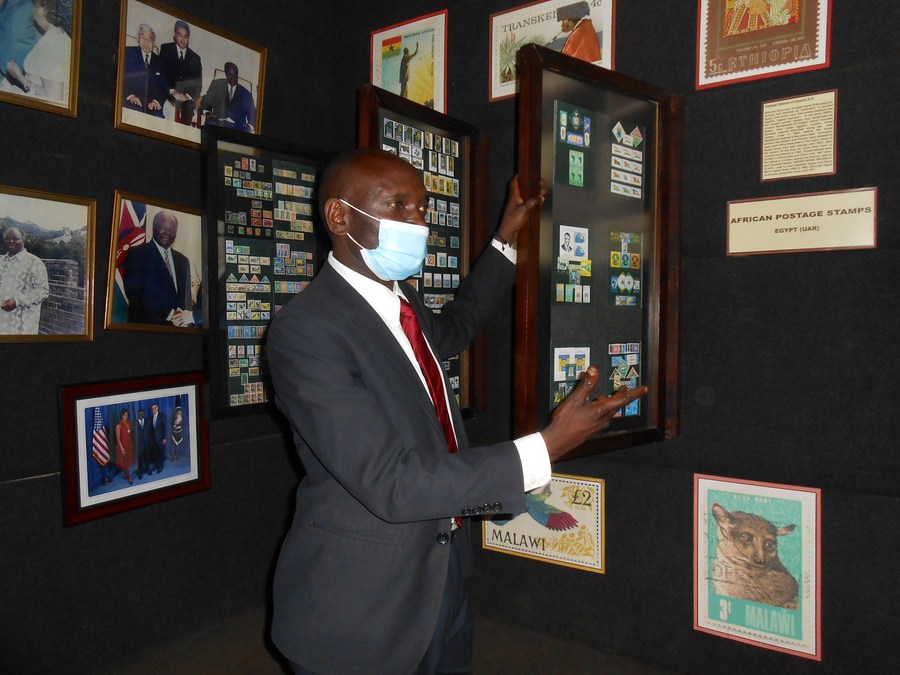
A letter bearing some stamps is housed inside the National Archives in Nairobi, Kenya, May 28, 2021. (Xinhua/Chrispinus Omar)
Stamp collections stored at the Kenya National Archives offer a glimpse into African history and proudly showcase the nation's modern-day wonders.
NAIROBI, May 29 (Xinhua) -- The national archives building which is located at the heart of the Kenyan capital, Nairobi, can sometimes be rendered invisible by the overpowering honking and business charter synonymous with East Africa's largest metropolis.
Among the outstanding cultural artifacts and historical documentation it holds, is a remarkable Pan-African stamp collection amassed by a venerated cultural enthusiast Joseph Murumbi.
As stated by Francis Mwangi, director of Kenya National Archives, the accumulation is possibly the richest in Africa with the capacity to offer a glimpse into the history of some countries in the continent.
"These stamps were sold to us by the Murumbi Trust Foundation around 1976. The stamps were part of a large trove of collectibles from Murumbi and his wife. Philatelists visiting us have remarked that this accumulation comes second after the most comprehensive one believed to be in Britain," Mwangi told Xinhua during a recent interview.
Kenya can trace its usage of postage stamps to its history as a protectorate and colony under the British Empire.
The first stamp was issued around 1890 by the Imperial British East Africa Company, the commercial association chartered to administer Kenya by Britain. It bore the sun and crown motif and the value was in annas and rupees.
The ensuing years would see Kenya continue using postage stamps inscribed with varying messages determined by the reigning imperial government which took over from the Imperial British East Africa Company, following its insolvency status.

A curator stands beside a trove of stamps at the National Archives in Nairobi, Kenya, May 28, 2021. (Xinhua/Chrispinus Omar)
After gaining independence, Kenya started deploying stamps that asserted her new status.
Stamp issuance would now be guided by matters that were of significance to the new self-governing state.
Current trends in stamp release by the Postal Corporation of Kenya showcase their usage to convey fundamental messages.
In 2018, the postal service company in association with the Kenya Wildlife Service launched a stamp bearing the image of Sudan, the last male northern white rhino, to raise awareness on the conservation of endangered species.
The notable commemorative release came after Sudan died due to poor health while sheltered at a conservancy in northern Kenya.
Present-day stamp releases are being seen to send messages of advocacy, endearment, or current happenings of the country.
"Stamps can easily create an awareness of Kenya to a resident and non-resident as they provide information of the political scene, while others boast of Kenya's pioneering industries and its dominating position in global athletics," said Mwangi.
Some of the earlier stamps released to the public after independence were printed with the face of Kenya's founding father Jomo Kenyatta holding his recognizable fly whisker with the letters Uhuru (freedom in Kiswahili) inscribed either on the bottom of the small paper or vertically.
Depictions of Kenya's biodiversity also featured in the initial circulation.

A sample of a past issuance by the government of Kenya housed at the National Archives in Nairobi, Kenya, May 28, 2021. (Xinhua/Chrispinus Omar)
Inside the archive is a stamp of a fierce-looking lion in the savannah, a cheetah on the flight, and a docile-looking bush baby alongside other animals that pull tourists to Kenya.
According to Evans Okumu, a curator at Kenya National Archives, stamps go beyond being a requisite for letter deliveries, and they are a channel of engaging foreigners and citizens in equal measure.
"Stamps were crucial for African countries after they attained independence because whatever the country grew, made, or mined would be advertised through the adhesive stamp," said Okumu,
"Even now, new releases tell what our country has to offer; sprawling national reserves containing an assortment of animals, a robust cash crop industry, reliable transport industry, and a reputational education sector," he added.
Okumu decried the absence of brick and mortar philately stores in the country. Nevertheless, he appreciated a sustained curiosity of philately going by the number of people visiting the facility.
With the likelihood of letter correspondence being outdated due to the prevalence of faster means of communication, philatelists maintain that this scenario will make the hobby more exciting as everyone will be scrambling to get hold of the circulating stamps.
The archive is yet to receive another large collection. It is now calling upon members of the public to bring forth items or documentation that hold intrinsic value for posterity. ■




